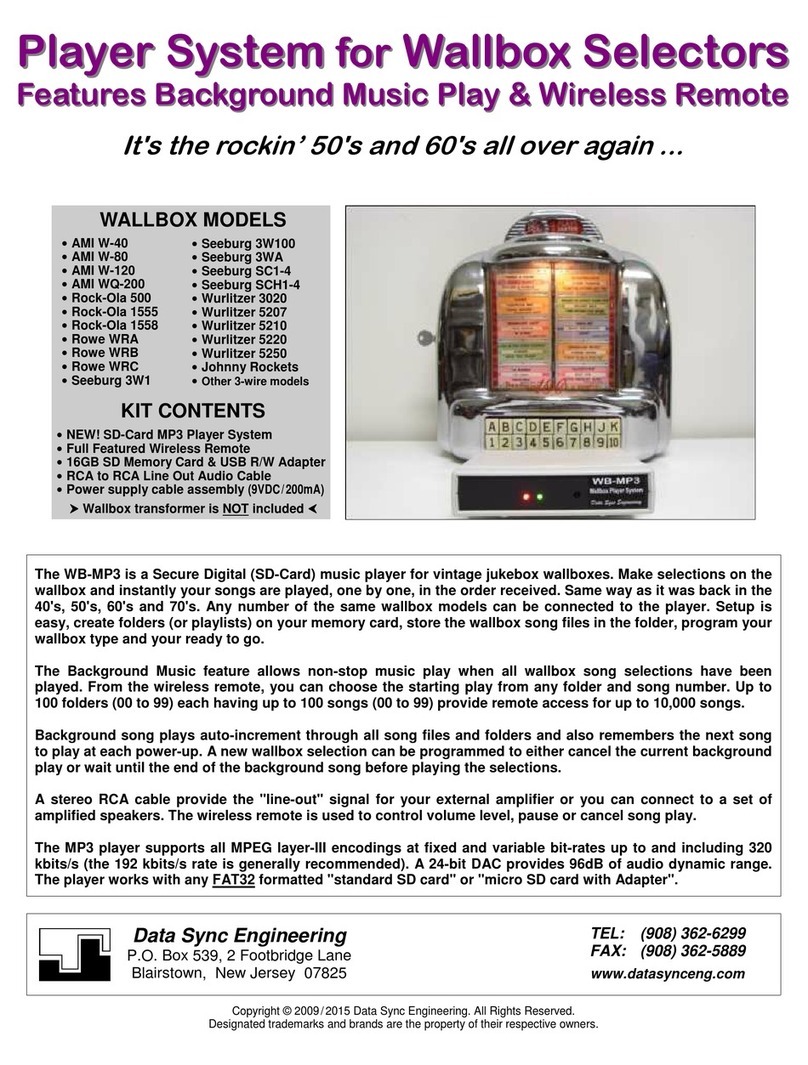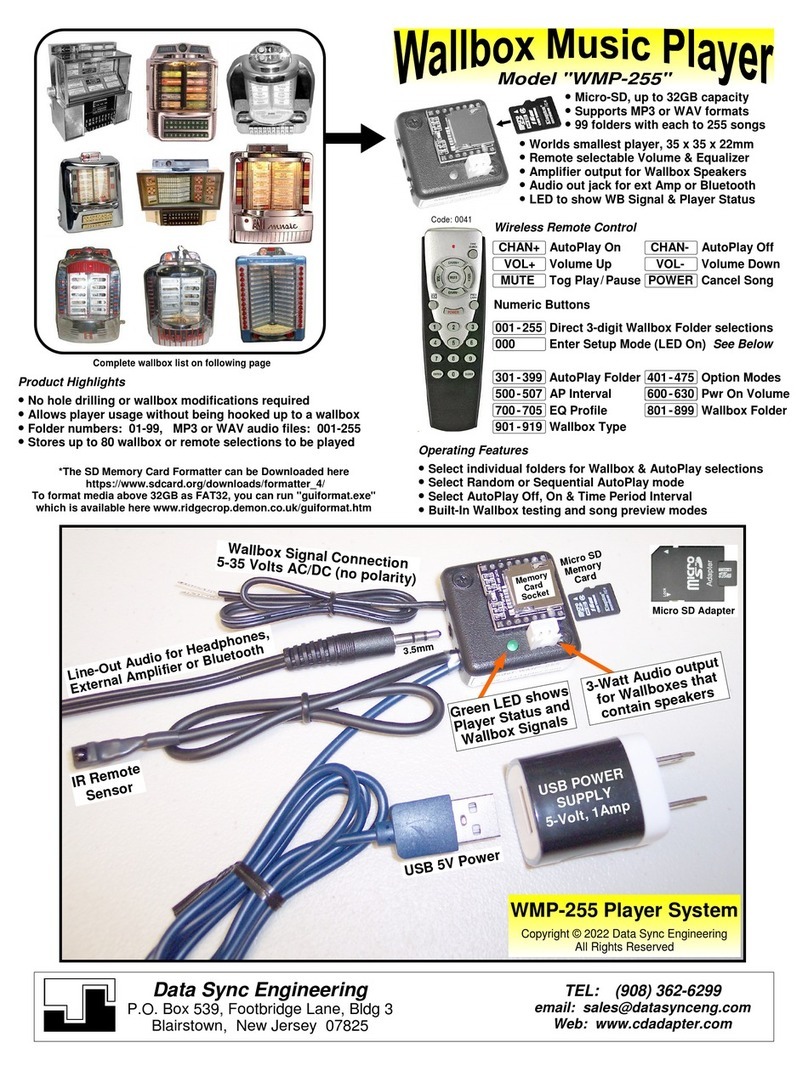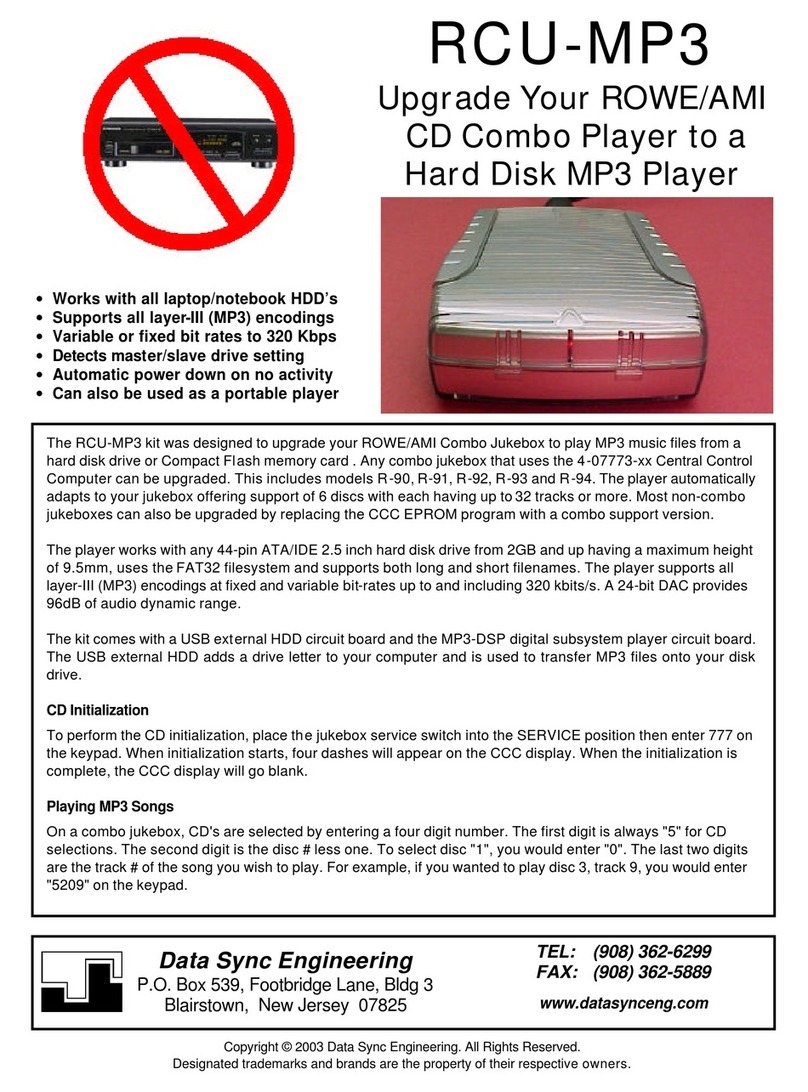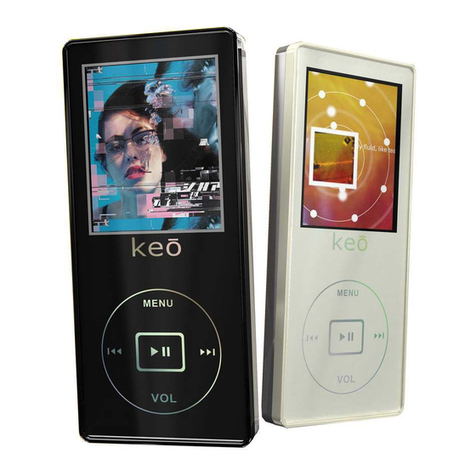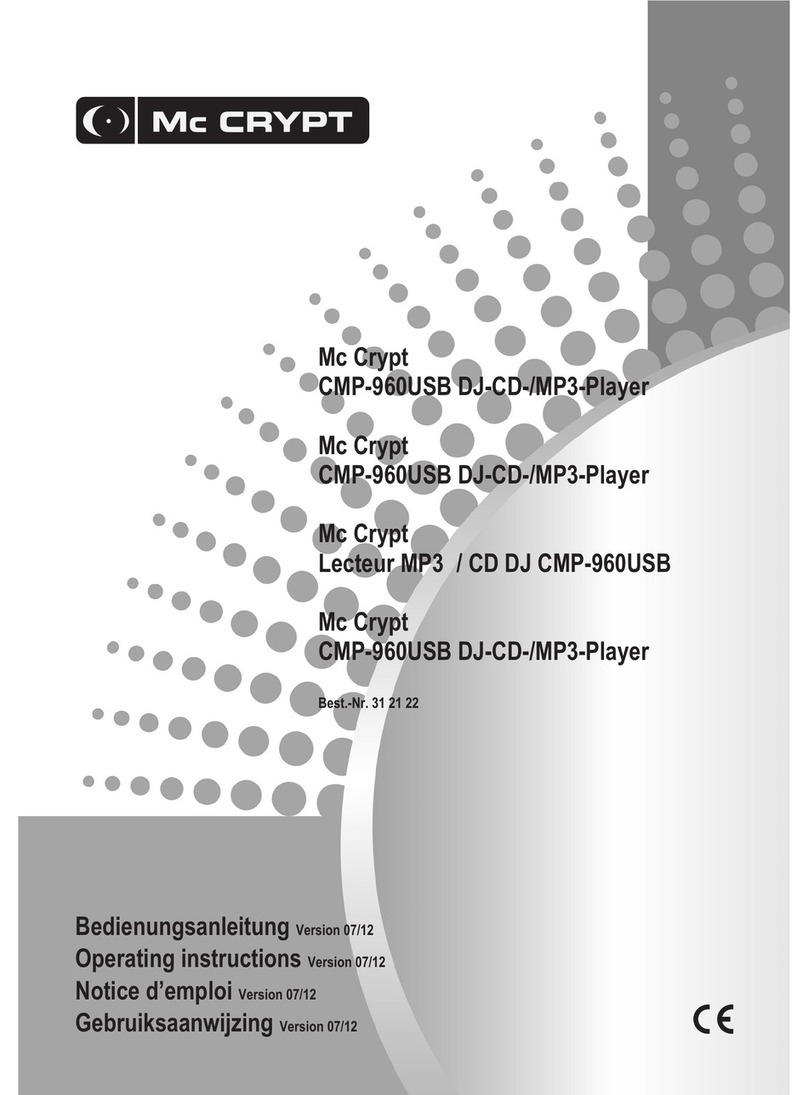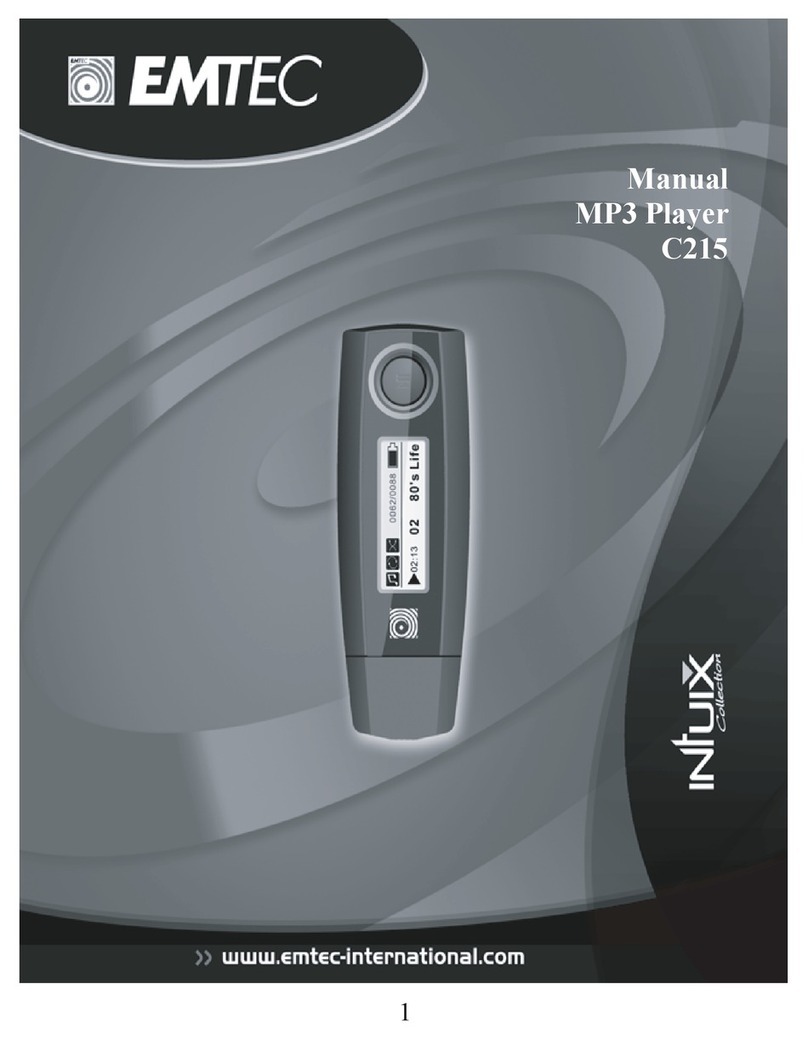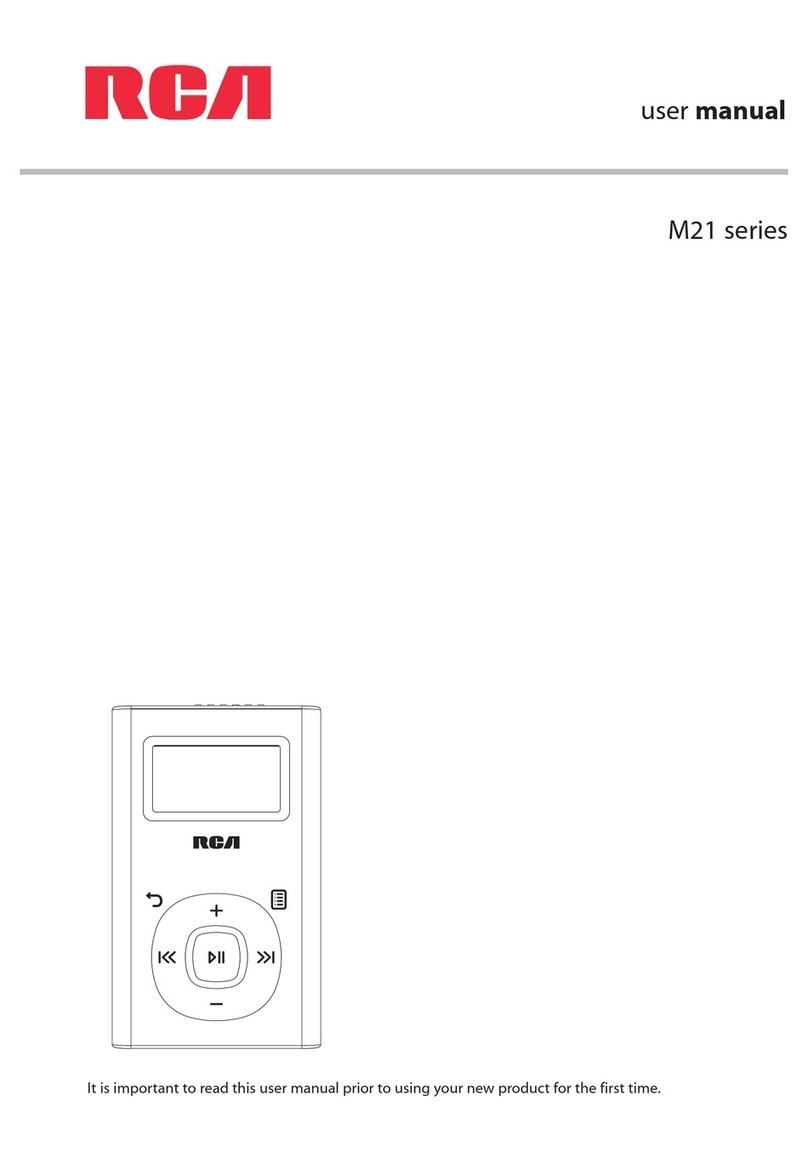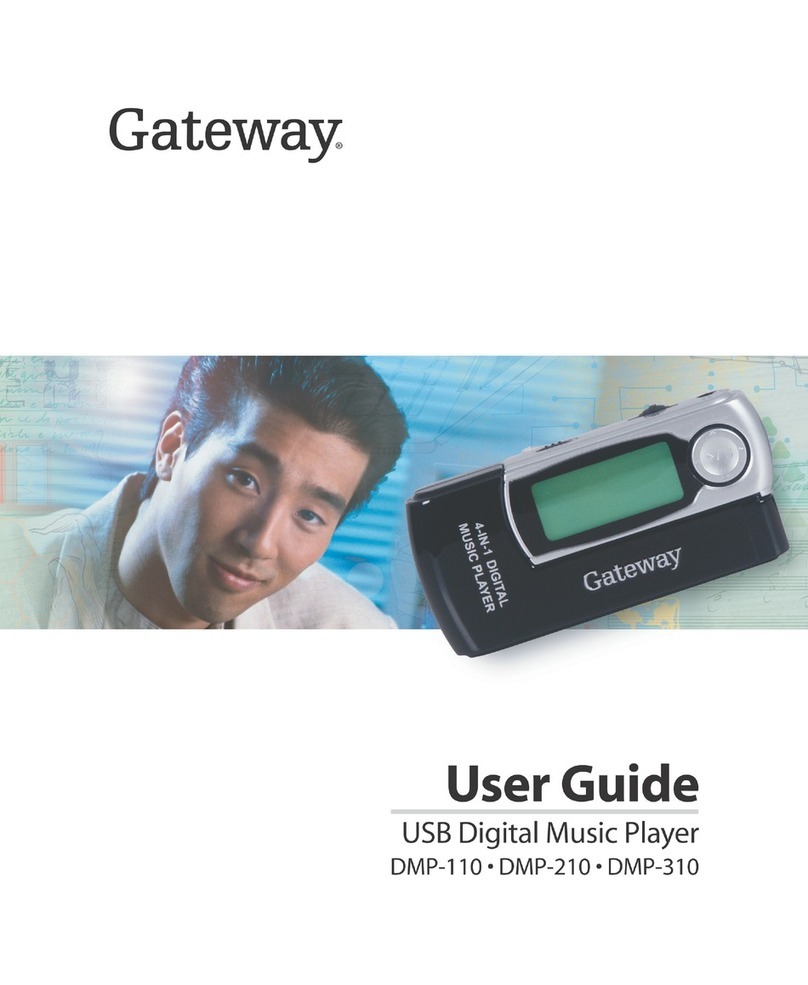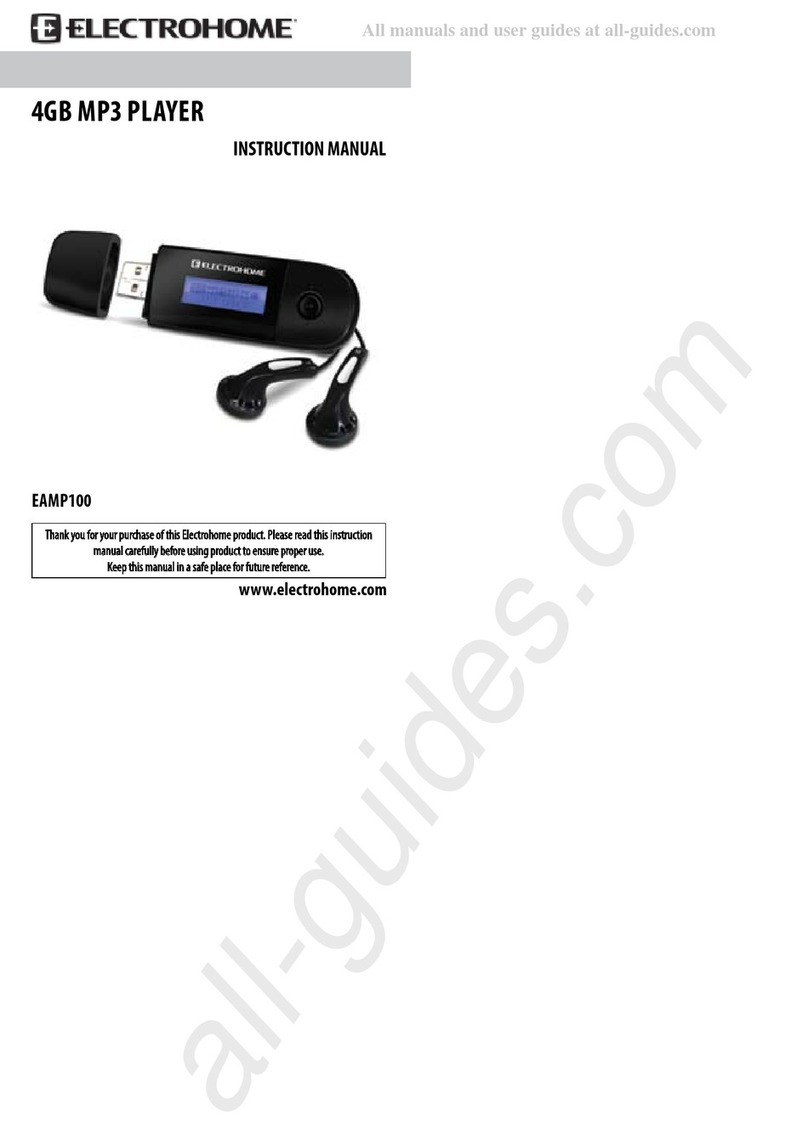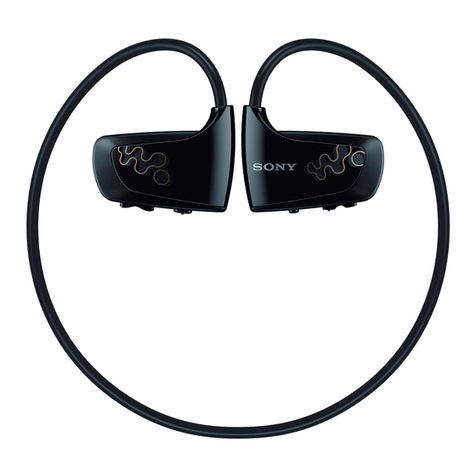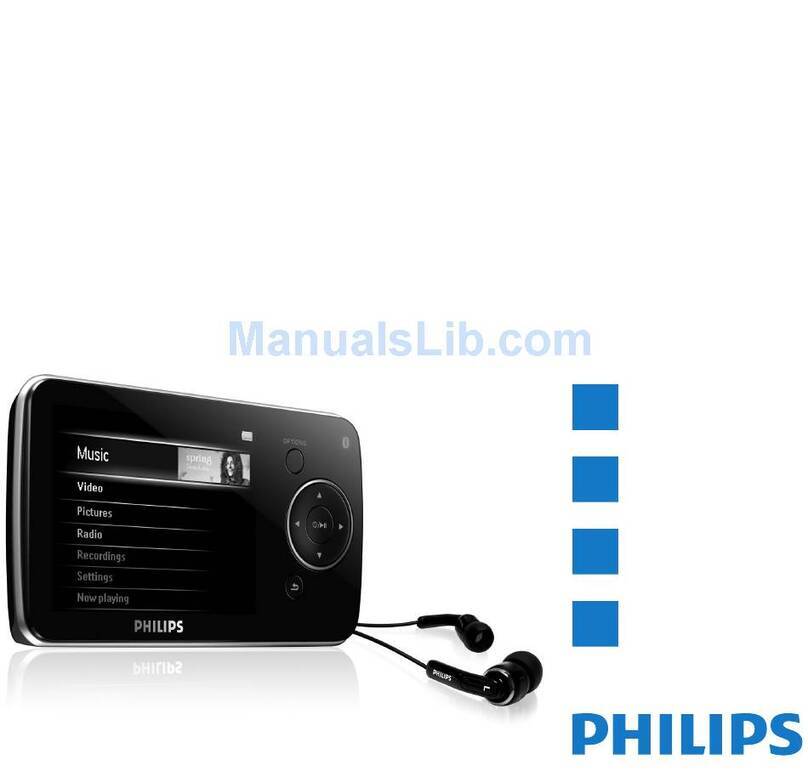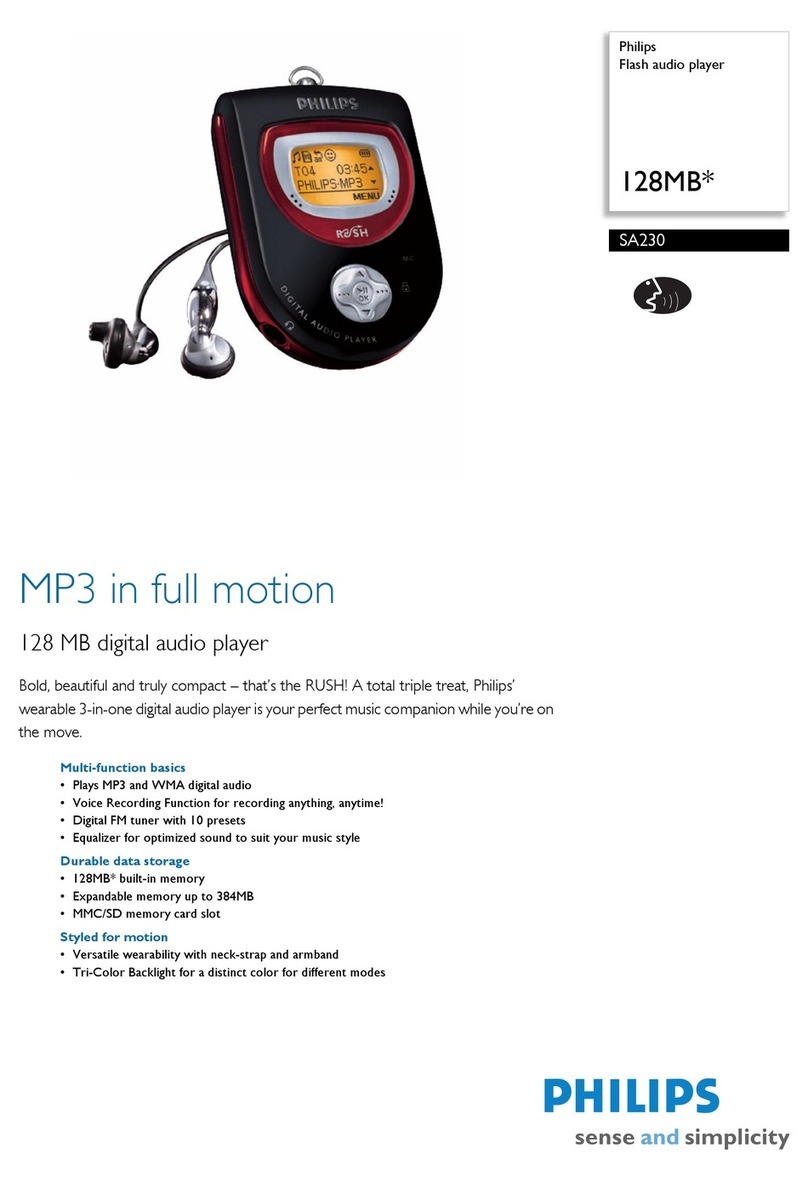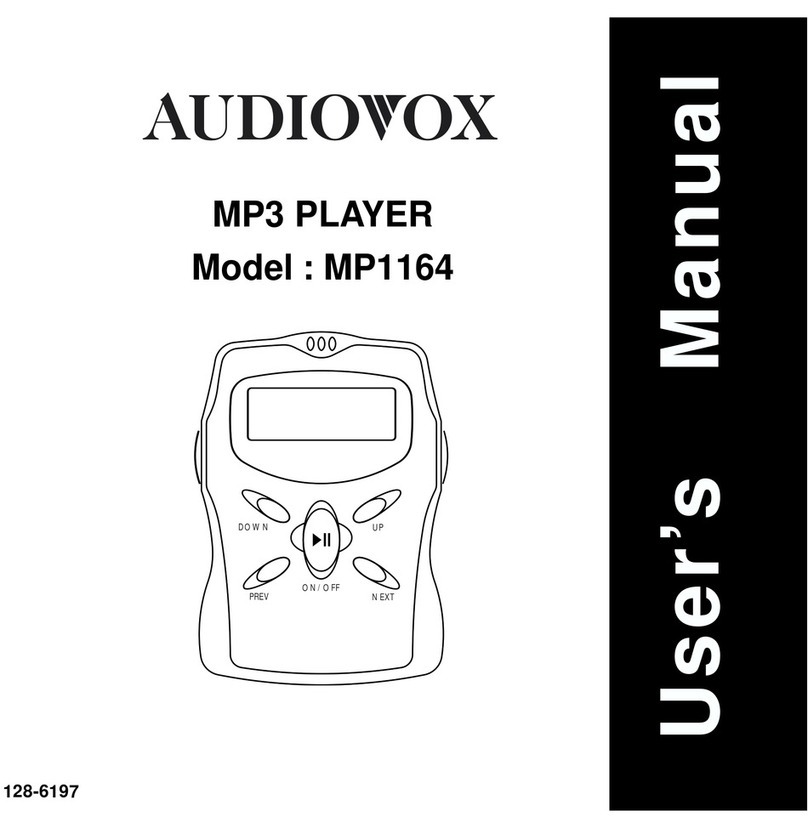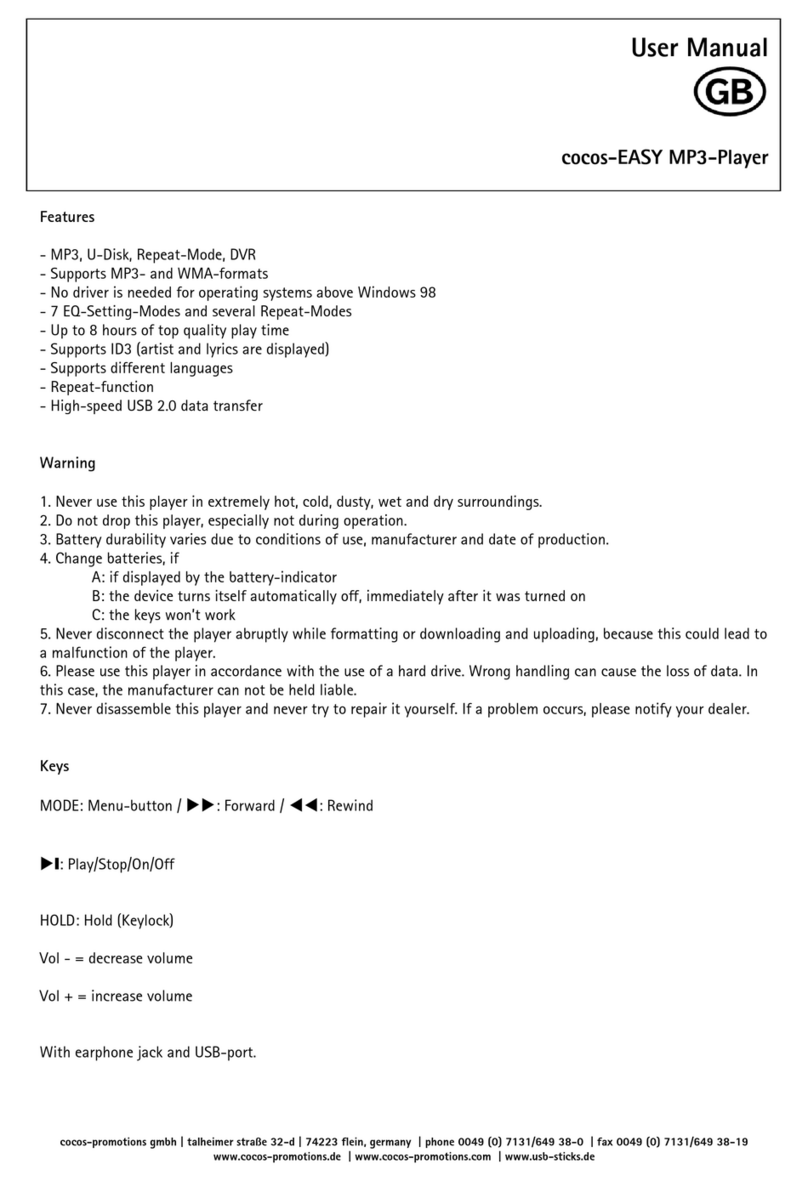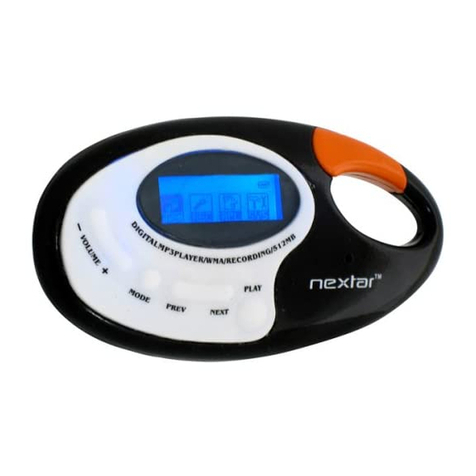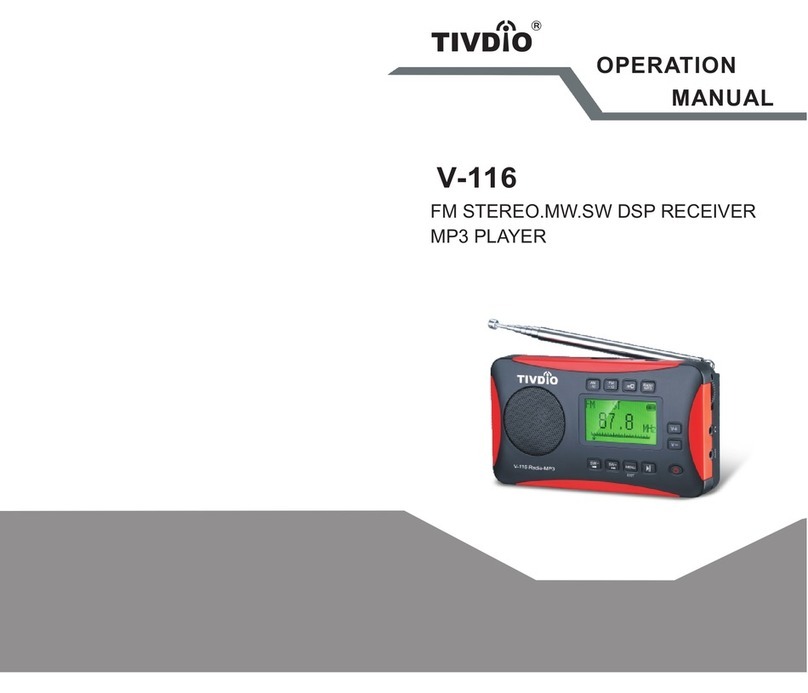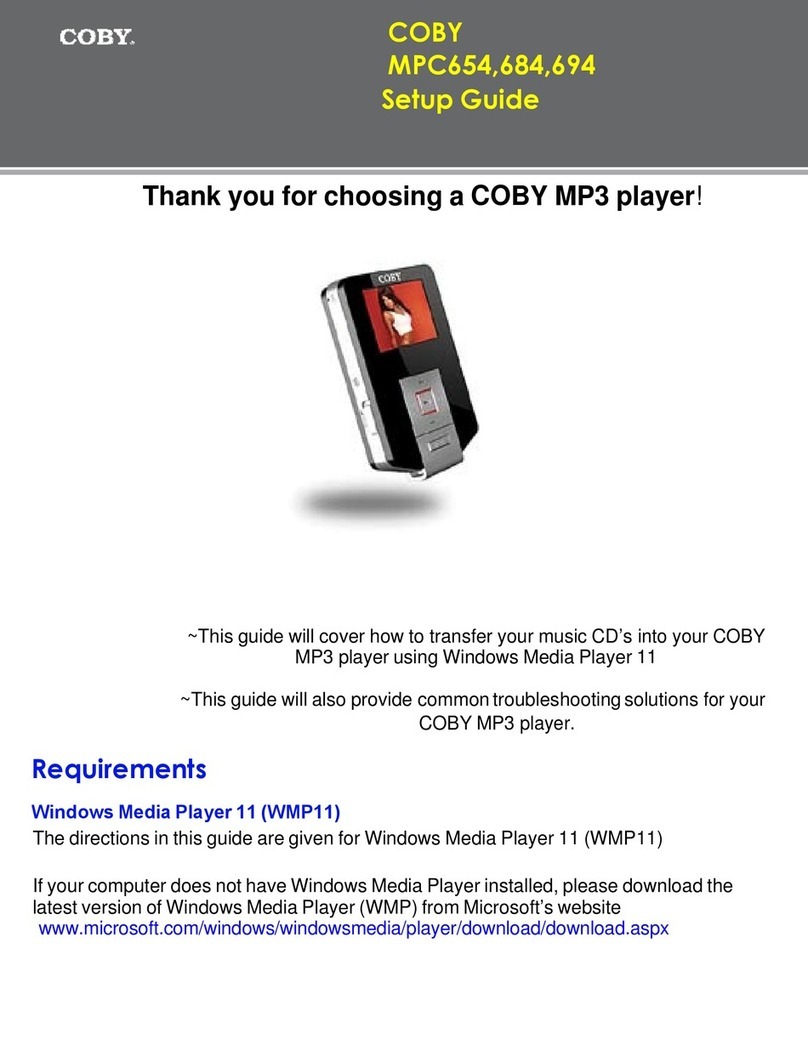Data Sync Engineering NSM4MP3 User manual

The NSM4MP3 is a micro-computer based hard disk player that replaces the entire CD player
mechanism in your NSM ES IV-CD technology model jukebox. The hard disk player works with any
jukebox that uses the # 174-873 Control Unit CD board or uses the CDM3 player in the CD changer.
This includes the Caravelle II, Fascination, Fire, Fire Bird, Fire Country, Firestorm, Galaxy, Performer
Grand, Silver City, Silver Sky, Soundmaster plus others. Installations a snap! Only two connections,
a 4-pin audio cable and an 8-pin control connector to position ST8 on the Control Unit board. The
player takes only seconds to install, without any modifications to the jukebox. Best of all, the hard
disk player will not skip and will never need to be cleaned or lubricated. The player works with any
PATA 44-pin ATA/IDE 2.5 inch laptop/notebook hard drive from 2GB and up. Uses the FAT32
filesystem which is compatible with Windows, Mac, Linux and other systems. A typical 100 CD
jukebox, with an average of 20 tracks each, would require a 10GB hard drive or Compact Flash card
at the CD quality bit rate of 192 Kbps.
Data Sync Engineering
P.O. Box 539, Footbridge Lane, Bldg 3
Blairstown, New Jersey 07825
TEL: (908) 362-6299
FAX: (908) 362-5889
Web: www.datasynceng.com
NSM4MP3
Copyright ©2005 Data Sync Engineering. All Rights Reserved.
Designated trademarks and brands are the property of their respective owners.
•Works with all laptop/notebook HDD’s
•Supports all layer-III (MP3) encodings
•Variable or fixed bit rates to 320 Kbps
•Detects master/slave drive setting
•Automatic power down on no activity
HDD or CF MP3 Player
For Your NSM ES-IV CD Jukebox
DISCLAIMER –PLEASE READ
The NSM4MP3 kit was developed for jukebox owners for non public performance use. We do not
supply jukebox licenses and do not have any knowledge of what is required. It is the jukebox
owners responsibility to obtain all applicable licenses for public performance of copyright music.

The hard disk drive has two sets of connector pins.
43-pins on the left side and 4-pins on the right.
Position the disk drive onto the circuit board then align
the left side pins with the 44-pin IDE connector.
Slide the disk drive forward into the connector. The 4-pins
on the right are not used.
This is the MP3 digital subsystem
player circuit board with a hard disk
drive attached.
The Hard Drive is not included !
This is the Compact Flash
Memory card version. It requires
the "IDE to CF" adapter board
which plugs into the 44-pin IDE
connector.
The "IDE to CF" adapter board is
available as a separate item.
The Hard Drive or Compact Flash
Memory cards are also available.
Assembling the Hard Disk Drive or Compact Flash Memory Card
The MP3-DSP music player system

Connecting IDE 2.5" Hard Drives
Using the USB 2.0 External HDD Cable
The 2.5" IDE Drive has one connector on
the rear. This 44 pin connector is IDE
DATA and IDE Power combined. This
connector has a blocked socket and must
be installed in the correct orientation.
Match the blocked socket with the missing
pin on the drive mechanism.
2.5" IDE Mechanisms get their
power from the USB port.
Laptop
NoteBook
2.5" Hard Drive
Permanent mount
or removable
Mount-down
holes at
each corner
Mounting ScrewsRubber Feet
Arrow
Faces
Up

Creating New Folders for Disc Numbers
Assemble your disk drive to the USB external HDD board.
Open Windows Explorer
Plug in the external HDD USB cable into your computer.
Within a few moments, a new disk drive letter should appear.
For this example we see “Removable Disk F:”
If you did not see a new disk drive letter, follow the instructions
in your USB manual about setting up your new disk drive or
you can visit www.cdadapter.com and go to the FAQ section.
To create a new folder …
Single click the new drive letter to hi-lite,
Click File | New
Then click on Folder
You should see a New Folder name.
Change the name …
The first two letters must be your disc
number from 00 to 99. The following
letters can be any text you choose.
Optional Compact Flash Card Adapter
The 44-pin IDE adapter allows Compact Flash
memory card usage. Works with FAT32 formatted
cards 2GB and higher.
Approximate song capacities:
CF Size @128 Kbps @192 Kbps
2GB 500 400
4GB 1,000 800
8GB 2,000 1,600
16GB 4,000 3,200
32GB 8,000 6,400
64GB 16,000 12,800
Insert the memory card into the adapter then plug
the adapter into the 44-pin IDE connector.
CF Memory
Inserted
here
44-Pin IDE Connector

Drag & Drop Your MP3 Song Files
Select the disk and directory for your source of MP3
song files then click the +at “Removable Disk (F:)”
to expand the folders.
If you wish to store the entire set of songs, click on
the first song at the top, scroll down to the last song,
hold down the SHIFT key then click the last song.
The entire list should be hi-lighted. Move your mouse
over the list then hold down the left mouse button
and drag the list to your F: drive folder.
If you wish to store a single song, place your mouse
over the song then hold down the left mouse button
and drag it to your F: drive folder.
Previously, folders were numbered to identify disc positions, here, MP3 song names must be numbered
to identify their track position. Most MP3 “rippers” or “extractors” will provide this track numbering feature
for you. All characters after the two digit track number are ignored and can be any text you choose. Just
like for CD’s, you must have sequential track numbers, you can not have skipped sequences.
MP3 song files can be changed at any time, simply delete the old file and insert the new one.
If you need to change or add the selection position
number of a song, place the mouse over the song
then right click and select Rename.
Position your mouse to the start of the song name
then left click. You should see a blinking cursor
waiting for you to edit.
Setting the Selection Position of Your Songs

NSM ES-IV Jukebox Installation
Hooking Up The Digital Music Player To Your Jukebox
Assemble your Hard Disc Drive or Compact Flash memory
to the MP3-DSP digital music player board.
Plug in the 9-pin mini DIN connector (arrow or notch at the
top). Connect the power supply and D-Sub connectors as
shown at the left.
At the jukebox Control Unit board connector position ST8,
unplug the 8-pin CD Mechanism connector and plug in the
NSM4MP3's connector (blue wire facing toward ST5).
Unplug the connectors at the back of the CD mechanism
changer, attach the 4-pin jukebox audio connector to the
Ground Loop Isolator, plug the players RCA audio output
connectors to the other end of the isolator.
The wall adapter plugs into the jukebox internal outlet.
Built-In Diagnostics
When the player is powered up, diagnostics are performed
followed by song indexing. The LED will be blinking rapidly
during this time. Depending upon the number of songs,
this can take up to a few seconds to complete. The LED
will stop blinking when finished.
If an error is detected, the LED will continually flash an
error code of one to four blinks each,
(1) INITIALIZATION ERROR, disk drive is not inserted
correctly or MP3 player board failure.
(2) FILESYSTEM ERROR, unable to locate FAT32
filesystem or drive was not formatted.
(3) NO FOLDERS FOUND, a directory folder is used for
each CD, check disk contents.
(4) NO MP3 FILES FOUND, MP3 files are used for each
audio track, check disk contents.
Playing MP3 Songs
Your jukebox operates exactly as it did before, two digit
disc number and two digit track number.
The jukebox and player are also capable of having up to 99
tracks for each disc but you may need to set parameter
P22 to play tracks higher than 24. The first two digits are
the maximum disc number and the next two are maximum
track number. Factory setting is 0024 which is 100 discs
having up to 24 tracks.
NSM ES-IV series jukeboxes do not employ track select
verification. In other words, you can select a track number
that does not exist. In this case, the jukebox will revert to
play track number 1 on that selected CD.
POWER SUPPLY
AUDIO OUTPUT
MP3 PLAYER
TO JUKEBOX
CONTROL
TO
JUKEBOX
AUDIO
FROM
MP3
PLAYER
9-PIN
D-SUB
37-PIN
D-SUB
Ground
Loop
Isolator
Other Data Sync Engineering MP3 Player manuals
